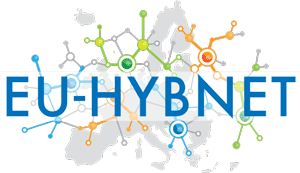EU-HYBNET held its 2nd Future Trends Workshop, #FTW on 5th of March 2022, in hybrid format (in person and online).The goal of the annual Future Trends’ Workshop is to think outside of the box and creatively about the future threats to our societies in Europe and what type of hybrid threat potential there is. The theme for the EU-HYBNET Future Trends’ workshop 2022 was “Democracies on the Edge?”. The aim of the workshop was to organize in-depth discussion on the challenges brought to democracy from polarization, radicalization of political debates, populism and how those are accentuated by the digital media.
The event was opened and chaired by Dr. Hanna Smith, director of research and analysis at European Center of Excellence for countering Hybrid Threats (Hybrid CoE) together with Dr. Sabina Magalini Researcher at UCSC. It gathered more than 100 people. The keynote speech by Mr.Jonas Cederlöf – DG DEFIS stressed that in our current security environment it is important to know also what we are doing ourselves to increase our resilience against hybrid threats as well as what the adversaries are doing. The keynote panel with programme director of European Digital Media Observatory (EDMO) Dr Lauri Tierala and the strategic advisor for research at the German Council on Foreign Relations Dr. Georgios Kolliarakis explored the importance of evidence in decision-making and response planning while at the same time there is a need to write strategies that are forward looking and based on foresight.
Breakout sessions were divided into three groups:
* Changing populism: what are the forms of populism? How will populism evolve and will it be a determining political movement in the future?
* Instrumentalization of social networks: what are current social networks? How will the galaxy of social networks look like in the future? Will information virality models give and deepen social networks’ future harm potential at systemic levels?
* Constitution of international groups: what narratives and topics unite and create movements transnationally? How this can be used as a tool by outside actors? Are these likely to grow into political force or are they more a disruption?
Conclusions and findings from the breakout sessions:
Identifying trends, which can have threat potential, in the social domain of democratic societies is not easy. Populism belongs to the category of concepts that are difficult to define, however it is part of democratic societies’ dynamics. Populism exposes our vulnerabilities and has potential to erode the comprehensive approach, designed to counter hybrid threats, from within. It can also act as force multiplier for hybrid threat activity and as destabiliser of our societies which then can result to unhealthy polarization.
The trends that were identified:
• Increasing difficulty to contextualise information which gives room for malign influence and misinterpretations.
• Increasing profiling of individual and group behaviours – for priming purposes? How this will be used against us in the future remains to be seen.
• Digital social networks are increasingly also a space for “counter attacks”, not only for hybrid threat actors to exploit. How the rise of “cyber stars” and ability to wage cyberwarfare from home will affect our societies?
• Formation of new type of networks with unexpected connections. How an antivaccination people will find anti-NATO groups and how they might end up spreading pro-Russian narratives – many more of examples like this exists. Are states able to address the new type of transnational networks?
If you are interested in joining EU-HYBNET’s network, you can read the associated information and apply the project’s website.
For further information on the EU-HYBNET, you can follow the project through Twitter and LinkedIn.



